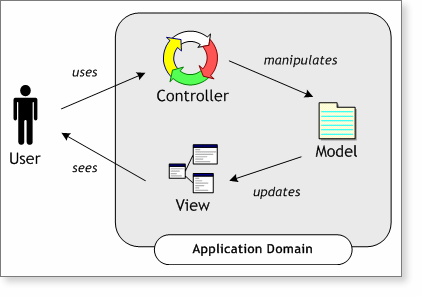CSC/ECE 517 Fall 2009/wiki1b 13 za
History and Applications of the MVC Pattern

Trygve Reenskaug
Trygve Reenskaug has published historical documents on MVC that date back to 1973. His first note on the MVC pattern consisted of : Model, View, Controller and Editor. The 'Editor' is a short-lived component that the 'View' creates when necessary. This component is created as an interface between the 'View' and the input devices. After Reenskaug left Xerox PARC, Jim Althoff with a group of other people implemented a version of MVC specific to the Smalltalk-80 class library [Ref http://heim.ifi.uio.no/~trygver/themes/mvc/mvc-index.html]. MVC pattern served as a means to simplify the implementation of complex systems.
The MVC design pattern is different from the MVC architectural pattern. In fact there are many other design patterns - Analysis, Creational, Structural, Behavioral [Ref http://en.wikipedia.org/wiki/Design_pattern_%28computer_science%29]. Ward Cunningham and Ken Beck who were working with Smalltalk were the first to start the MVC design pattern in 1987.
More information on the use of MVC as an architectural pattern or a design pattern can be found at http://en.wikipedia.org/wiki/Model%E2%80%93view%E2%80%93controller
How it came into prominence
MVC offers a clear separation of the presentation logic from the business logic. With an MVC framework, it becomes easy to accommodate future changes and implementations in design or code. MVC pattern gained prominence because of its clean modular approach that allow programmers to follow a formal approach for implementing business or enterprise level applications.